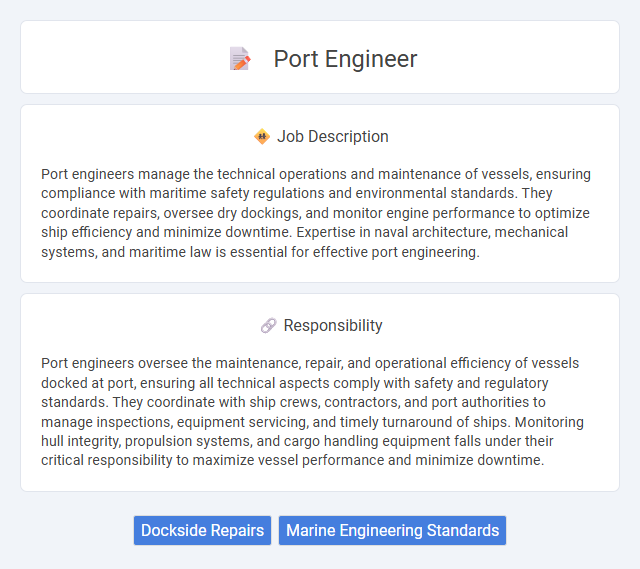
Port engineers manage the technical operations and maintenance of vessels, ensuring compliance with maritime safety regulations and environmental standards. They coordinate repairs, oversee dry dockings, and monitor engine performance to optimize ship efficiency and minimize downtime. Expertise in naval architecture, mechanical systems, and maritime law is essential for effective port engineering.
Individuals with strong problem-solving skills and the ability to work under pressure will likely find the port engineer role suitable due to its technical and operational challenges. Those who enjoy coordinating between different teams and possess a detail-oriented mindset may have a higher probability of success in this position. However, candidates with low adaptability or limited communication skills might struggle to meet the dynamic demands of port engineering.
Qualification
Port engineers require extensive knowledge in naval architecture, marine engineering, and project management to oversee vessel maintenance and ensure regulatory compliance. A bachelor's degree in marine engineering, naval architecture, or a related field is essential, along with certifications like STCW and knowledge of international maritime regulations. Strong analytical skills, problem-solving abilities, and practical experience with ship systems and repair processes are critical qualifications for this role.
Responsibility
Port engineers oversee the maintenance, repair, and operational efficiency of vessels docked at port, ensuring all technical aspects comply with safety and regulatory standards. They coordinate with ship crews, contractors, and port authorities to manage inspections, equipment servicing, and timely turnaround of ships. Monitoring hull integrity, propulsion systems, and cargo handling equipment falls under their critical responsibility to maximize vessel performance and minimize downtime.
Benefit
A Port engineer likely offers significant benefits such as ensuring the efficient operation and maintenance of ships, which can lead to reduced downtime and cost savings. There is a strong probability that their expertise in overseeing repairs and compliance with maritime regulations enhances safety and operational reliability. Employers may find value in their ability to coordinate between ship crews and technical teams, improving overall logistical efficiency.
Challenge
Port engineer roles likely present challenges related to managing complex logistics and ensuring the seamless operation of marine vessels. They probably must solve unexpected technical problems while coordinating with multiple teams under tight deadlines. Navigating regulatory compliance and environmental standards could also pose ongoing difficulties in this profession.
Career Advancement
Port engineers play a crucial role in managing vessel maintenance and ensuring compliance with maritime regulations, making their expertise highly sought after in the shipping industry. Career advancement opportunities often include progressing to senior engineering management positions, such as Chief Engineer or Technical Superintendent, which involve overseeing larger fleets and more complex operational challenges. Continuous professional development, certifications in marine engineering, and experience with advanced ship technologies significantly enhance prospects for leadership roles and international assignments.
Key Terms
Dockside Repairs
Port engineers specializing in dockside repairs manage critical maintenance and emergency repairs of vessels while docked, ensuring minimal downtime and compliance with maritime safety standards. They coordinate with ship crews, shipyards, and suppliers to oversee hull inspections, machinery servicing, and structural repairs, optimizing vessel performance and operational readiness. Expertise in regulatory requirements, materials, and repair techniques enables port engineers to effectively troubleshoot and execute cost-efficient repair solutions during port stays.
Marine Engineering Standards
Port engineers ensure vessel compliance with international marine engineering standards such as SOLAS, MARPOL, and IMO guidelines to maintain safety and environmental protection. They coordinate inspections, repairs, and maintenance schedules, adhering strictly to classification society requirements like ABS, DNV, and Lloyd's Register. By managing technical documentation and overseeing machinery performance, port engineers optimize operational efficiency and minimize downtime in port operations.
 kuljobs.com
kuljobs.com